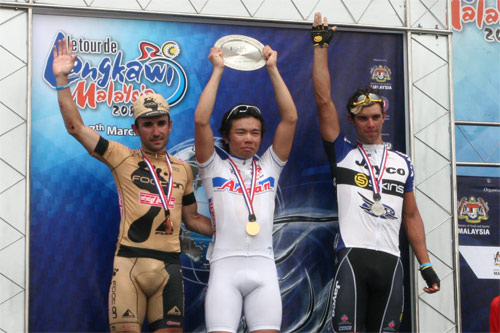
The early years of the Tour de Langkawi very much saw the Asian riders play second fiddle to the teams and competitors from Europe, Australia and the US. A lack of experience, a smaller pool of talent, and a deficit of high quality racing and coaching meant it was difficult for those outside cycling’s traditional stronghold countries to fare well.
Fast-forward through the fifteen editions of the race and is is clear that things have been changing. On Thursday Japanese road race champion Taiji Nishitani outsprinted the entire field to win into Parit Sulong, netting the biggest victory of his career. This was no soft win, no lucky break; it was a case of speed and strength, one rider taking on many others and coming out on top. For that reason his triumph is a very significant one.
Well over 100 stages have been contested in the history of the event and now Japan has won three of those. Today’s victory also represented the sixth Asian win; the recent pattern of those triumphs shows that competitors from that area appear to be performing at a top standard with greater regularity than before.
The first victor of a stage in the Tour of Langkawi was Wang Kam Po in 2000. He was followed by the Japaneses Fukushima brothers, with Koji winning in 2005 and Shinichi triumphing in 2007. Korean competitor Lee Won-Jae did likewise in 2008 and then Samai Amari from Indonesia came out on top last season.
Four stage wins in as many years is a good sign for Asian cycling, and so too is the extremely aggressive riding that they have displayed this year. Malaysian sprinter Anuar Manan has also impressed, taking a top six finish each day, holding the points jersey until Wednesday’s stage, and still very much being in the running for that contest.
He agreed that things are looking better. “It seems that the Asian cycling level is improving,” he told Velonation at the post-race press conference. “Also, at the same time, we have two very good riders who participated in the Tour de France last year, Fumiyuki Beppu and Yukiya Arashiro. I am a national champion and I also try to perform very well, as with that title as I represent the country.”
Irishman David McCann has competed with the Giant Asia team for several seasons and, when asked about this apparent improvement, suggested that an additional factor might be at play. “There are a lot of Europeans going a lot slower in the last three or four years,” he said, making a presumed reference to doping. “They are not as unbelievable as they used to be, so maybe that is something to do with it.
“Also, some of the sprinters – especially those from Japan – can be world-class.”
Nishitani told Velonation that he would very much like the opportunity to race in Europe. He’s hoping that a strong season would enable him to attract the attention of a good team. There are plenty of others with the same desires and if things continue to progress, the first Asian Tour de France stage winner may not be that far off.